From Alexandra Truppi, Education Manager for Curriculum and Instruction
 On Saturday, March 16, students from eleven Boston high schools
competed in the Boston finals of the August Wilson Monologue Competition.
Huntington Teaching Artists worked in residencies in classrooms at each school,
introducing students to August Wilson's life and work and teaching lessons in
acting and text analysis. Each classroom held its own competition to choose a
winner to represent his or her school in the city-wide competition.
On Saturday, March 16, students from eleven Boston high schools
competed in the Boston finals of the August Wilson Monologue Competition.
Huntington Teaching Artists worked in residencies in classrooms at each school,
introducing students to August Wilson's life and work and teaching lessons in
acting and text analysis. Each classroom held its own competition to choose a
winner to represent his or her school in the city-wide competition.
Antonio Stroud of Boston Day and Evening Academy won first place at the
end of the Boston finals with his performance of Hedley from
Seven Guitars
. Iliana Mendez of Brighton High School placed second with her performance of Rose from Fences
, and
Derek Lindesay of Codman Academy Charter Public School came in third with his
performance of Memphis from Two Trains Running.
Antonio, Iliana, and Derek will compete at the National Finals on May
4, where they will also participate in workshops with theatre professionals,
attend a Broadway show, and compete against students from around the country at
the August Wilson Theatre on Broadway.
Education Manager for Curriculum and Instruction Alexandra Truppi
recently sat down with Boston's top 3 to discuss the competition, their love of
theatre, and their hopes for their upcoming trip to New York.
First off, congratulations on being Boston's August Wilson Monologue
Competition top three! How does it feel to be the winners?
Iliana: I still can't believe it!
Antonio: I can because I said I was going to win. I did what I meant to do by working my
hardest. I don't ask for much in life other than an opportunity. Give me an
opportunity and I'll do the rest.
Iliana: Yeah,
man!
(Iliana and Antonio high-five)
Derek: I
just feel privileged to be here. All the other people in the competition were
amazing. I came in first at my
school and third for Boston and that tells me that I am amazing, too.
What was the morning of the Boston competition like for you?
Iliana: Nervous.
When I won for my school, I thought it would be easy. Most of the people in my
school had never heard of August Wilson, so I was all like, "Yeah, I got this."
But then when I went to the workshop with all the other winners a couple weeks
before the competition, I was intimidated. To see that everyone was at such a
high level, I was like "Oh, wow! These people are really good!" I knew I had to
give it my all.
Antonio: I had such great support from my friends and family. A staff member from my
school, Ms. Kunst, took me to breakfast that morning. I was just getting into
character and being grateful for the opportunity. Going to New York to perform
on Broadway is something most actors don't ever get to do, never mind a kid
from Roxbury.
Derek: It
was kind of a breath of fresh air. I was dealing with a lot in my personal life
and at school, and it was good to get away from all that. Meg Campbell, the
founder of my school, took me out to lunch after the competition, and when we
were talking I realized how much I've grown as a person. It gave me a lot of
pride.
Let's talk about the monologues you chose. What drew you to these
particular pieces and what do you love about them?
Iliana: Well, I read
Fences in middle school, and when I read this monologue even then
it reminded me of my mother. She was betrayed, too. My father left and we
didn't know what to do. When I had
to pick a monologue to perform, I read this one again and remembered how I used
to just look at my mother and not know what to do for her. At first, working on
it was hard because I'm Hispanic and I didn't think I could portray a black
woman. But then I remembered my mom and it just clicked.
Derek: I
first read my monologue about two years ago. I thought Memphis was sort of a
contrarian. It's political but also humorous and I think I'm both of those
things, too, sometimes. I just really understood what he was saying. Like last
week I performed it at this event for my school and people thought I wrote it
or something.
Antonio: I
identified with the language. It's so powerful. It made me think a little bit
of a Muhammad Ali. Muhammad Ali was talking about how black people are
beautiful. He was called "the greatest" at a time when black people were told
they were not human, so the words in the monologue were powerful to me. The
last line that says, "Satan, I will tear your kingdom down" — I didn't really
understand it first until right before the competition at my school. I was
saying those words and just suddenly understood them — Hedley's talking about
the bigger picture. He is going to destroy the oppression of black people and
the negative notion of what it means to be black.
Iliana, what was it like to work with Huntington Teaching Artist
Solange Garcia, and how did she help you with your performance?
Iliana: It
was so great. Most of the kids in
my class didn't know anything about August Wilson at the beginning. I did
because I read
Fences in middle school,
but I was the only one. Solange filled us up with information on August
Wilson's life and work. I don't know what class would have been like without
her. She made us read
Fences all over
again and gave us information about August Wilson as a person that made us
understand it in a new way. I really don't know what it would have been like
without her.
All three of you have strong interests in theatre and performing. What
do you love about it?
Iliana: This was my first year really
participating in theatre. I did
Henry V at Actors' Shakespeare Project
(with Antonio!) and I really didn't think about it until then. At first, I was
really scared because I was wondering, "what if I forget my lines, what if I
can't memorize this?" But I realized that once you're really in it, it just
comes.
Antonio: I enjoy stories. We all have a
story in us and come from something or somewhere. You don't know where someone
is coming from until you experience it. I knew after I performed
Othello at my school that this was
something I wanted to do. Acting on stage is when I feel strongest. The fact
that you have to memorize makes you become better, more disciplined. Theatre is
the hardest form of acting because you have to stay in character the whole
time. Denzel Washington, Sidney Poitier, Laurence Fishburne – those are some of
my favorite actors and they all do theatre. When I did
Othello, a woman in the audience was from Actors' Shakespeare
Project, and she invited me to come do their summer intensive and I got the
lead in
Macbeth there. Then I did
Henry V.
Derek: It was kind of funny. This is my fifth
year in high school. I got kept back. And I've changed so much since freshman
year because of theatre. I hated public speaking, I was shy. I love it now,
though. Put a mic in my hand! Back then I didn't care for it, but over time it
transformed me as a person. I was afraid before and I still am sometimes, but
it opened me up. Even working with other people, I used to hate that but now I
want to be part of a team. The thing about theatre is that it's not a one-man
show. It's a team. Even if it's
only one person performing. There's a whole team that helps make it happen.
The three of you attend three very different schools: Boston Day & Evening Academy, Brighton High School, and Codman Academy Charter Public
School. How did you each end up at the school you currently attend? You're all
really bright—how do you use the unique character of your schools to do what
you need to do educationally?
Iliana: I went to school in Puerto Rico when
I was little. I was raised there and came to the U.S. in sixth grade. School in
Puerto Rico was so different. Everyone was friends there but here there were a
lot more cliques. When I got here, I was scared and a follower. I went to
Brighton High School because that was where my sister was going and I liked the
safety of having her there. A lot of people hear "Brighton High School" and
think something negative, but I say you shouldn't do that until you walk its
hallways. There are so many students there who are just like me, all growing.
Everyone has their own story. It has made me more confident and brave.
Derek: When
I was in eighth grade, my mom made my brother and me write essays to apply to
Codman Academy Charter School, and we got in. It's a small school of only like
150 kids. It was weird at first and the curriculum is really hard. I got held
back, not because I'm not smart, but because I had some personal stuff going
on, like my aunt passed away freshman year. But it's a wonderful school. I've
gotten great opportunities by going there, like doing all this theatre. And I
just came from lunch with the boss at a law firm that I interned with over the
summer through my school.
Antonio: I've
been to three high schools. First
I was at West Roxbury High School, and then my mom and I moved to Hyde Park so
I went to Hyde Park High School. But a month after I got there, it was one of
twelve schools that the district closed. You know, I love to learn, but I hate
school. I was always doing great in extra-curriculars—like being on the board
of a nonprofit that I got asked to represent at the White House—but I always
had to convince myself to be disciplined with tedious things. So I transferred to Boston Day and
Evening. It's very different from regular Boston schools. The curriculum is
competency based. They meet you where you are and you go from there. It makes you accountable for your own
education. Another thing I like about my school is that we're treated as
adults.
You will travel to New York City to complete in the national August
Wilson Monologue Competition on May 4. What excites you most about the trip to
New York?
Antonio: The
opportunity for networking. Like I
said, I don't ask for anything but an opportunity. I'm also excited to be
bringing my mother. My family gives me my determination and motivation, so
bringing my mother to Broadway is such a blessing.
Iliana: I
love Broadway and musicals so to get to see a Broadway show in person is
exciting. I've been obsessed with Broadway for years, and now I get to perform
at a Broadway theatre in the competition!
Derek: I'm
just excited for the vacation. I'm finishing up senior year and thinking a lot
about college stuff, so it's exciting to be getting away from all that for a
few days.
Antonio: Yeah . . . And winning for BOSTON!
ABOUT THE COMPETITION
The August
Wilson Monologue Competition was created by Kenny Leon's True Colors Theatre
Company. This year, the competition is open to high school students in city
schools in Atlanta, Boston, Chicago, Los Angeles, New York, Pittsburgh, and Seattle. In our third year
facilitating the Boston regional competition, the Huntington Theatre Company's
Education Department collaborated with eleven Boston Public Schools: Another
Course to College, Boston Adult Technical Academy, Boston Day and Evening
Academy, Brighton High School, Codman Academy Charter Public School, Dorchester
Academy, Edward M. Kennedy Academy for Health Careers, English High School, New
Mission High School, McKinley South End Academy, and Snowden International School
at Copley.

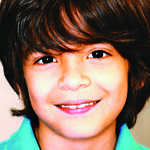 Name: Akash Chopra
Name: Akash Chopra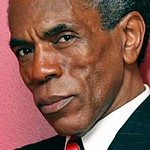 Name: André De Shields
Name: André De Shields Name: Kevin Carolan
Name: Kevin Carolan Name: Tommy Derrah
Name: Tommy Derrah
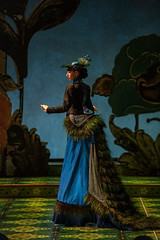
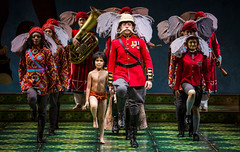
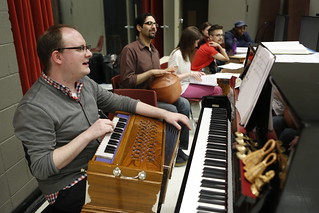







 LT: When you started writing Rapture, Blister, Burn, were you thinking consciously about feminism today?
LT: When you started writing Rapture, Blister, Burn, were you thinking consciously about feminism today?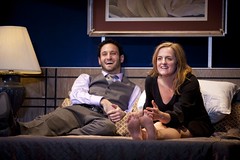



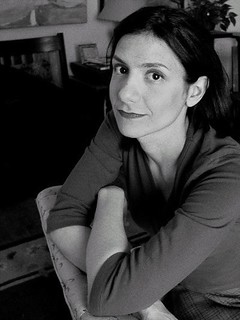 A popular assumption about feminists — not just among certain right-wing personalities — is that they are ugly, sexless, humorless harpies that no man wants (unless women advocate for access to birth control, then they are common sluts). In Rapture, Blister, Burn, Gina Gionfriddo grapples with the realities of women’s lives and pulls off a popular comedy about feminism. Fortune favors the bold and, as noted by Variety, “Gionfriddo’s some kind of genius.”
A popular assumption about feminists — not just among certain right-wing personalities — is that they are ugly, sexless, humorless harpies that no man wants (unless women advocate for access to birth control, then they are common sluts). In Rapture, Blister, Burn, Gina Gionfriddo grapples with the realities of women’s lives and pulls off a popular comedy about feminism. Fortune favors the bold and, as noted by Variety, “Gionfriddo’s some kind of genius.”